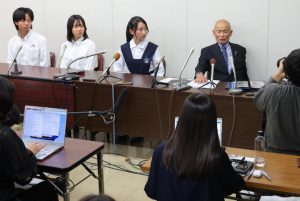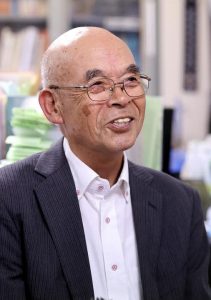Special feature series — Nihon Hidankyo awarded Nobel Peace Prize, Part 1: Journey marked by struggles, hopes passed on to future generations
Oct. 12, 2024
Revealing wounds, communicating A-bombing experiences
At Hiroshima City Hall on October 11, sometime after 6 p.m., Toshiyuki Mimaki, 82, repeatedly pinched his cheek, saying, “It is almost too good to be true,” after witnessing the moment the Nobel Peace Prize awardee was announced. Mr. Mimaki serves as co-chair of Nihon Hidankyo (Japan Confederation of A- and H-Bomb Sufferers Organizations) and chair of Hiroshima Hidankyo (Hiroshima Prefectural Confederation of A-bomb Sufferers Organizations). His eyes filled with tears. He mentioned the names of some of the victims of the atomic bombings—including Sunao Tsuboi, former chair of Hiroshima Hidankyo—who had died without fulfillment of their desperate wish for the elimination of nuclear weapons. Remembering the late Mr. Tsuboi and the others, Mr. Mimaki said, “I wish we had received the prize when Mr. Tsuboi and the others were still alive. I think they’re celebrating now, though.”
Sueichi Kido, 84, secretary-general of the Nihon Hidankyo organization, responded excitedly to questions from the media at his home in Gifu City, “I think this was the result of the struggles made by the A-bomb survivors (hibakusha) over so many years.” He added, “The faces of the people before me come to mind.”
Hidankyo’s path began in 1956, 11 years after the dropping of the atomic bombs. In the words of the declaration made at the organization’s inaugural general assembly, “We hereby reaffirm our pledge to save humanity from its crisis through our experiences.” With that, the organization has continued calling out the cruelty of nuclear weapons by revealing their own wounds caused by the bombings. In the 1970s, marked by continued tensions in the Cold War era, the organization launched a full-fledged effort to communicate their A-bomb experiences overseas. When the prize was announced, Norwegian Nobel Committee Chair Jørgen Watne Frydnes said, “No nuclear weapon has been used in war in nearly 80 years. The extraordinary efforts of Nihon Hidankyo and other representatives of the Hibakusha have contributed greatly to the establishment of the nuclear taboo.”
In recent years, the organization has collaborated with other peace organizations in Japan and overseas on a signature drive urging all nations to conclude a treaty for the banning and elimination of nuclear weapons. That work helped achieve adoption of the Treaty on the Prohibition of Nuclear Weapons (TPNW). Nevertheless, today the world faces a growing threat from nuclear weapons. On the day of the award announcement, Mr. Frydnes expressed his own fear that nuclear weapons could be used in the Middle East or Ukraine and threaten all of humanity.
Kunihiko Sakuma, 79, chair of the other organization bearing the Hiroshima Hidankyo name, spoke about his interpretation of the decision to award the prize to Nihon Hidankyo. “I think the call made by hibakusha that, ‘Nuclear weapons should never be used again, with the only way to resolve conflict being through discussion,’ was given high marks for its impact,” said Mr. Sakuma. He added, “We want to make sure the prize serves as momentum toward Japan’s ratification of the Treaty on the Prohibition of Nuclear Weapons. With that in mind, hibakusha must exert even more energy.”
Next year marks the 80th anniversary of the atomic bombings. The average age of the A-bombs survivors is now 85.58 years. However, Hidankyo did not stop working on this day, October 11. During the daytime, its representative members were seen at Japan’s parliamentary Diet, where they were engaged in efforts to demand that leaders of both ruling and opposition parties achieve the abolition of nuclear weapons.
Terumi Tanaka, 92, co-chair of Nihon Hidankyo, learned of the news of the award at his home in Niiza City, Saitama Prefecture after returning from that work. Mr. Tanaka said, “I hope our being awarded the prize serves as impetus for the horror of nuclear weapons to be communicated [by such leaders] throughout the world.” While expressing his pleasure, he also looked ahead to the future. “It is very sad that the only nation that experienced nuclear bombings in wartime has not signed or ratified the Treaty on the Prohibition of Nuclear Weapons. I hope the prize can convince the Japanese government to stand at the forefront of the effort to eliminate nuclear weapons,” said Mr. Tanaka.
-------------------------
Nihon Hidankyo, a nationwide organization of A-bomb survivors throughout Japan, was awarded the 2024 Nobel Peace Prize. The group was formed at a time in which there was almost no government support available for A-bomb survivors or any organization on which they could rely. The organization’s work to bring to light the inhumanity of nuclear weapons while suffering wounds of their own and having their own loved ones taken from them has finally been recognized by the international community. The organization is where it is today precisely because of the difficult path it has traveled. Herein, the Chugoku Shimbun will report on its achievements from the standpoint of Hiroshima as well as look toward its future.
(Originally published on October 12, 2024)









